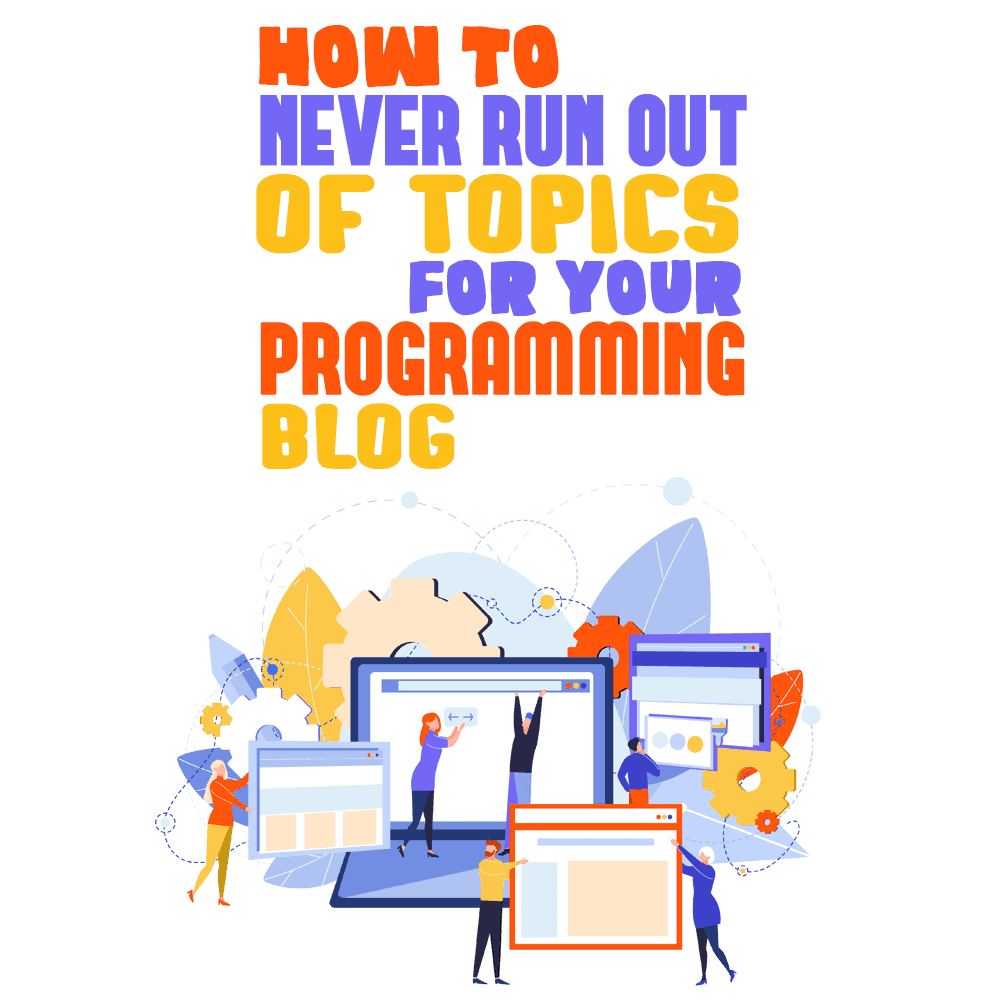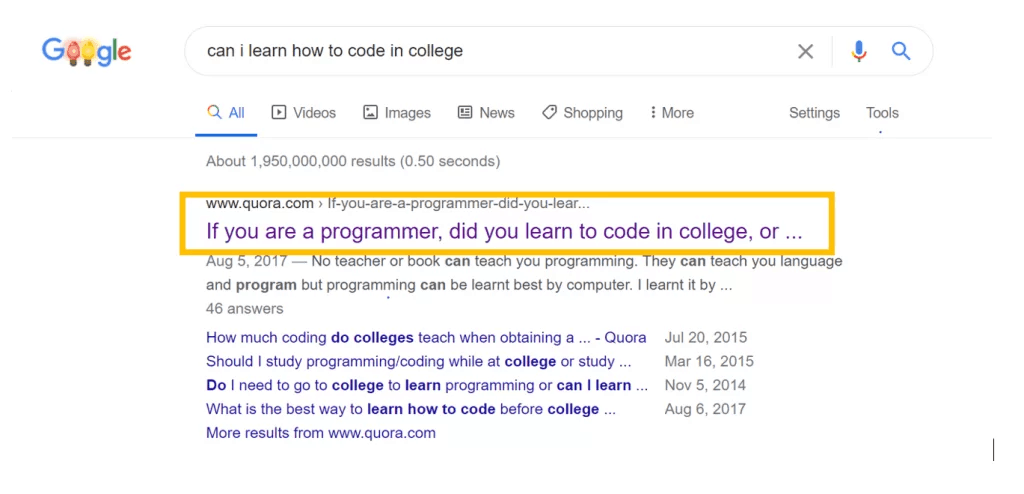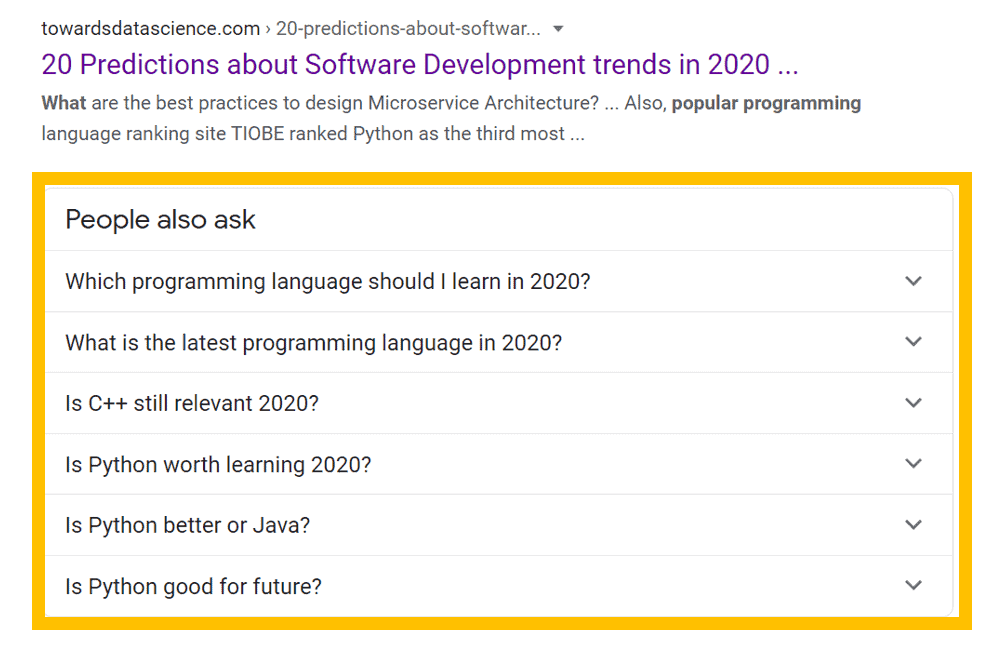 As your programming blog starts to grow, you might reach a point where ideas for content begin to dry up. That can happen when you’ve been blogging for awhile.
As your programming blog starts to grow, you might reach a point where ideas for content begin to dry up. That can happen when you’ve been blogging for awhile.
It can also occur at the moment you start your blog. It's usually a result of picking a niche that's too specific and hard to think of content for. But what happens if you aren’t as passionate about your niche as you thought?
Or what happens if you get burned out and can't think of any new ideas for articles?
These are valid concerns, and if you want to become a popular software developer you need to be aware of them. There won't be much wiggle room if your niche is too specific. For example, if your blog is about Python and you write all there is to know about it, what happens then?
To avoid getting stuck without any new ideas, you must have a content strategy. You have to find a way to branch out of a niche without confusing your audience. Luckily, this article is going to cover the “soft skill” of blogging for developers in detail.
What Is a Content Strategy and How Do I Use It?
A content strategy is the planning and development of written content for your blog. That is going to be your plan for coming up with new topics.
If you’ve been blogging for awhile, your content strategy will look something like this:
- Take the time to figure out other topics your audience likes.
- Post surveys on social media and directly ask your readers what they want.
- Use your email list to see what people like versus what they don’t.
- Do not stop writing about your niche completely.
- Slowly start branching out of your niche.
- Begin by creating content about something else related to programming.
- Then, alternate by writing about your niche again.
- Repeat the process.
Since you already have an audience, you can’t afford to lose them. The point here is to take your time.
Likewise, if you are new to blogging, your content strategy will be similar but more straightforward. The first few points do not apply since new blogs typically have no audience.
If you’re a new blogger, take this approach:
- Do not stop writing about your niche completely.
- Write about different topics once you start getting tired of your niche.
- Begin by creating content about something else related to programming.
- Then, alternate by writing about your niche again.
- Repeat the process.
For both new and mature blogs, the point of a content strategy is to rotate different articles while keeping and growing your readership. That way, you give the readers what they want while at the same time preventing yourself from getting burned out.
Just remember to be more cautious if your blog already has a large audience.
After you get the content strategy down, it’s time to find out exactly how to find topics when you get stuck.
Use Forums
The first thing you should do to keep fresh content flowing on your programming blog is to use forums. Forums are the number-one way to find blogging topics in 2021. They are even better to use if your blog is new. The best way for a new site to start ranking on Google today is to find less competitive topics with decent search volume. Forums will help you find those topics since it's the first place people go to ask questions.
Google ranks Quora and Reddit threads on page 1 because many people are asking the same questions that aren't getting answered. That's where your job comes in.
To come up with questions to ask, just put yourself in the shoes of someone Googling about programming. We all Google random stuff from time to time. Whenever a question pops up in your head about programming, type it in the search.
If you see the forum on the first page, it means you can rank for the topic. For instance, if I Google “can I learn how to code in college,” the first thing that comes up is a thread with somebody asking other programmers if it's better to learn code while in college or on your own.
If you scroll down a little further, you will see the same question asked on Reddit. That's the perfect opportunity for you to write a big fat detailed article on learning code in college versus by yourself.
Just remember to bookmark the page if you want to go back to it another time.
It's a great strategy if your website is new since it can't rank for more competitive topics, or if you’re an established blogger who needs some fresh content.
Write About Your Experiences as a Developer
Writing about your experiences as a developer is another way to keep pumping out quality posts. Imagine starting a programming blog as an inexperienced developer and picking JavaScript as a niche. Obviously, most of your content should focus on teaching JavaScript, yet you could also focus on some of your personal experiences with it.
For example, imagine writing an article about a project you're working on. It could be anything from a game to a website or even an app. Was it hard for you to develop that app? What did you have to go through as far as time management, stress, and the hours it took to make it happen? These are the things that people want to know.
Just look at David Walsh, one of the more well-known JavaScript bloggers on the web. If you go to his website, some of his posts share updates about his personal life. Like this one article about his experience being a “Dev Dad.”
His situation is relevant since he's sharing with his readers what he learned being a developer while raising a kid. If his audience is mostly people his age, then they'll want to know since they probably have kids too.
There will always be something going on in your life that you can share as a programmer.
Also, remember to give details about the failures and successes you had to go through.
Tell people about your attempt to develop and sell an indie game that flopped. Or how you tried learning Malbolge, one of the hardest languages out there, and succeeded! Writing these types of articles will build trust with your audience and provide endless topics to discuss.
Write About News and Trending Topics
One of the best ways to find consistent topics for your programming blog is to write about news. The tech industry is always changing. You can use that to your advantage.
It's an opportunity to give your opinion on trending topics. Readers want to hear what you have to say. Look to sites like hub.packtpub.com that offer programming news. One of their most recent articles was about game development with .Net, a developer platform that uses different tools and programming languages for developing games. You can go check it out and write what you think about it.
Now, obviously, if something big happens in the programming world, you should talk about that too. Just say what you think, and don't be afraid to be a little controversial.
Furthermore, you could type “what's trending in programming 2020” into Google and see what pops up.
From that search, it seems people are concerned about a few things:
- Which programming languages should you learn?
- What is the latest programming language?
- Is C++ still relevant?
- Is Python better than Java?
- Is Python good for the future?
All of these are potential topics for your programming blog. It looks like people mostly want to know about the future of some languages. Since things change so fast in this industry, it makes sense why they're asking that. You can update these posts every year and let others know which programming languages are still relevant.
Instead of making readers go to another blog for news, why not just have them stick around and get it from you?
Write About Blogging
This type of content is probably better for those who’ve already built a following but can’t think of more blog post ideas. But regardless, do you know what every blogger is qualified to write about? Blogging itself! That's right, if you blog, you can write and advise others on how to blog. But as a developer, you have an edge.
How? Well, most programmers don't like writing or marketing. It's just not in their field of study, which is why so many of them hesitate to start blogging. However, you've done the work and became an expert on it. You can teach other developers how to write a blog and market themselves.
And why wouldn't they want to get that advice from you? Not every blog niche works the same. Developers should get blogging advice from other developers.
Plus, it's just a natural fit. Nobody is going to wonder why you are talking about your blog on your blog. Yet, just make sure you’ve written a good chunk of articles already.
Like I said, this works better for more established blogs that already have an audience built up.
Write About the Technical Aspects of Blogging
Writing about the developmental aspects of blogging is another great option. It works well for both established and new bloggers. After all, it’s not that odd for a programmer to write about code.
You can help other entrepreneurs who own websites that have technical problems. Write articles on common technical issues and how to fix them. Or better, share ways in which website owners can customize the look of their sites with code.
Hiring developers can get pricey. Most business owners don't have that kind of cash, especially in the beginning. Show people how to use code and get really unique-looking designs.
Teaching inexperienced bloggers how to code is a great way to reach a broader audience. It will attract readers who aren’t just interested in tech.
That will help a new blog get the traction it needs in the beginning to grow. For older blogs, they can stay relevant with fresh articles and new people to read them.
Keep a Journal

Consider writing in your journal every day. You can write whatever is on your mind, just make sure to keep at it. Doing this will not only improve your writing skills, but it'll also help you come up with ideas for articles.
Try recording the daily work you do as a developer and use it as inspiration. You would be surprised by how many good ideas go to waste by not jotting them down.
Once the time comes when you're all out of topics to write about, whip out that journal. Those old notes will provide a catalog of valuable topics for articles.
The most brilliant minds from Einstein to Leonardo da Vinci all kept a journal. They wrote so that they wouldn't forget their thoughts.
You can use the same journal that has all your programming notes. Or you can get a new one and use it specifically as a diary.
Start a YouTube Channel
Now, I know what you’re thinking: I can’t think of blog topics, and you want me to start something new? Well, yes, and here’s why.
First, the time for developers to start their own YouTube channels is now. Look at the programming community on YouTube. It's growing, and more programmers are beginning to realize it. There are even people doing coding live streams now. Tech With Tim did a 12-hour coding live stream where he created a game using Python. The stream broke 2 million views.
To put that into perspective, if you look at people streaming last year's “Call of Duty” when it came out, Tim's stream has more views than all of them. Other developers who are streaming themselves doing code are also rivaling gaming streams in views.
That's pretty insane.
Second, YouTube gives older blogs a fresh start. By utilizing your channel as a separate platform, established blogs can experiment with new topics.
Start by making videos about stuff outside of your blog niche. If programmers enjoy your YouTube content, then consider incorporating some of it into your blog. It's the perfect way for older bloggers to distance themselves from their original niche and grow their readership.
Lastly, you can grow a YouTube channel faster than a blog. That is a huge benefit for new bloggers since blogs can take years to build traction.
The SEO ranking on Google for YouTube videos is instant. It can even land you on the first page for competitive topics, something most new sites can’t do.
That means you can discuss competitive topics that would be too hard to rank for on your blog. The more topics available to you from the start, the easier it will be to branch out of your niche.
Accept Guest Posts
Probably the best way to keep consistent content flowing on your blog is to accept guest posts. After all, what's better than somebody writing articles for you?
Guest articles are an excellent method for both new and experienced bloggers who are struggling to produce content. If you are a new blogger, accepting guest posts will help you build relationships, network, and get people linking to your site.
As an established blogger, guest posts are great for all of those reasons as well. And the audience you’ve already built up will get to experience the perspectives of different programmers.
To find people to post on your blog, you must do a little bit of networking. Here’s how you can get started:
- Comment on other blogs regularly.
- Write guest posts for other programming websites.
- Ask the owner of the blog to return the favor.
Or you can:
- Start a podcast, which can lead to interviews and collaborations with other programmers.
- Invite your podcast guests to publish guest articles on your blog.
However, if you're not new to blogging, all you really have to do is make a “write for us” page on your blog. I am, of course, assuming that your website is already well-known.
If that's the case, people will want to write for your site since they will get a quality backlink.
A Content Strategy Means Never Running Out of Topics

Remember to keep most of the content relevant to programming. You can do this by blogging about your achievements, failures, the news, what's trending, and much more.
Just because you started a blog within a specific niche doesn't mean you're confined by it. It's fine to write about personal matters and other programming topics. However, the most important thing is that you enjoy blogging. Because if you don't, then your blog will fail.
If you don't like your niche anymore or can't think of any more ideas, plan a content strategy now. Doing so will keep your blog relevant for years to come.


